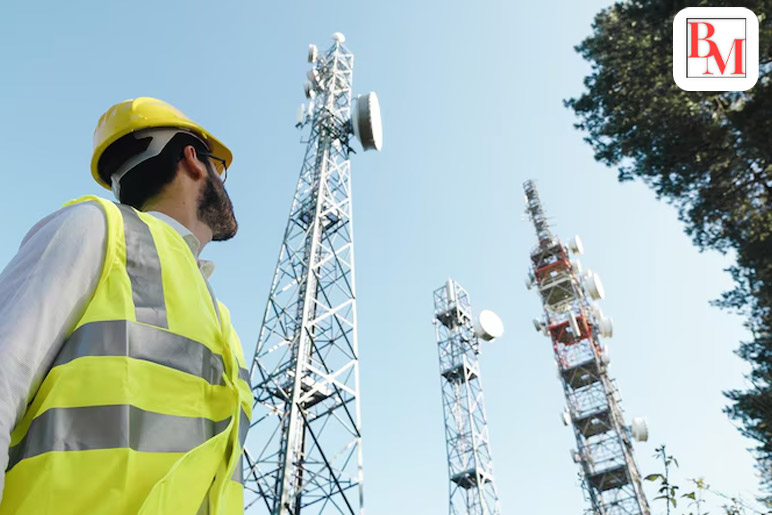Is telecommunications equipment a good career path for you? Telecommunications equipment, which includes tools and technologies for communication through phones, television, and the internet, holds immense potential for careers. Its importance to individuals and businesses is evident, and its complexity makes it a commendable endeavor.
This profession encompasses a spectrum of roles, spanning from entry-level positions that require minimal prior expertise to those steering the helm, spearheading the design of innovative telecommunications gear, thereby revolutionizing global communication.
This list of potential vocations in telecommunications equipment offers insights and inspiration for those interested in pursuing a career in this field.
The Top: The 5 Best-Paying Positions In Telecommunications Equipment
Embarking on a career in telecommunications equipment calls for a commendable level of proficiency, education, and inventive thinking, all of which contribute to the potential for substantial financial returns. Is telecommunications equipment a good career path? You will get the ideas when you know about the best-paying and startup-level jobs.
Among the most lucrative roles in this field are:
1. Broadband Engineer

Average Annual Salary: $75,100
A broadband engineer assumes the pivotal responsibility of overseeing the installation, upkeep, and repair of network equipment. With the requisite knowledge gleaned from a bachelor’s degree in telecommunications or a related field, coupled with several years of industry experience, they ensure the seamless operation of the system.
2. Telecommunications Manager

Average Annual Salary: $128,000
Tasked with discerning the requirements of their region or department concerning telecommunications equipment and personnel, a telecommunications manager crafts and executes strategic plans. This role hinges on a comprehensive understanding of the telecommunications system, necessitating both foresight and budgeting acumen.
3. Data Scientist

Average Annual Salary: $102,000
The burgeoning field of data sciences holds immense promise. Data scientists play a pivotal role in extracting insights from the colossal repositories of data, rendering them invaluable in the telecommunications equipment industry. Is telecommunications equipment a good career path for anyone who likes to explore multiple data research fields?
A penchant for computers and statistics, coupled with a bachelor’s or master’s degree in these domains, paves the way for a prosperous future.
4. Telecommunications Engineer

Average Annual Salary: $86,000
At the zenith of the pay scale lies the telecommunications engineer, entrusted with the design of communication systems underpinning connectivity for individuals and businesses. This role necessitates advanced education and an intricate understanding of complex technology, offering substantial remuneration in return for the expertise invested.
5. Antenna Engineer

Average Annual Salary: $91,178
In a realm where the telecommunications engineer conceives and develops systems, the antenna engineer crafts the very antennae vital to this process. Beyond design, their purview extends to maintenance, repair, and enhancements, further contributing to the evolution of these critical components.
10 Entry-Level Roles In Telecommunications Equipment
For those embarking on their journey into the world of telecommunications equipment, a myriad of entry-level opportunities beckon. The field is ripe with openings, promising growth, and a dynamic career trajectory. Whether serving as a foundation or a launchpad to loftier pursuits, these roles offer a diverse array of options:
1. Call Center Representative

Average Annual Salary: $29,000
Call centers form the nucleus of customer interactions in the telecommunications equipment industry. Responsibilities may span order processing, troubleshooting, and assistance, all of which are learnable on the job.
2. Telecommunications Civil Construction

Average Annual Salary: $32,001
This role encompasses the installation or preparatory groundwork for subsequent equipment installation. While prior construction experience is beneficial, many employers provide on-the-job training.
3. Satellite Dish Installer

Average Annual Salary: $37,000
Familiar to most, satellite dish installers ensure the seamless setup of these ubiquitous devices. Fearlessness of heights and a valid driver’s license are prerequisites, with on-the-job training facilitating proficiency.
4. Cable Installer

Average Annual Salary: $38,000
Much akin to satellite dish installation, cable installers ensure homes and businesses are wired for television and internet services. With the transition to streaming services, this role remains in demand, offering skill acquisition through employer-provided training.
5. Telecommunications Service Technicians

Average Annual Salary: $55,200
This role, though not for the novice, offers a trajectory for skill acquisition. Junior or apprentice positions provide a foothold, eventually leading to proficiency in the diverse equipment involved. When you searching for the answer to is telecommunications equipment a good career path or not. That means you already have some ideas about high-paying jobs in this field. Telecommunication services have huge growth potential.
6. Office Support/Administrative Assistant

Average Annual Salary: $36,000
Administrative roles form the backbone of any industry, including telecommunications equipment. Organizational prowess and proficiency in common software applications are key requisites.
7. Sales

Average Annual Salary: $54,008
Sales roles in telecommunications equipment span a wide spectrum, catering to end-users and various intermediaries. Opportunities abound in a dynamic field where demand drives remuneration.
8. Manufacturing

Average Annual Salary: $52,201
The bedrock of this industry lies in manufacturing essential equipment. Entry-level positions on factory floors contribute indispensably, forming the foundation of this vital process.
9. Utility Systems Technician

Average Annual Salary: $49,100
Operating at the intersection of data management and infrastructure, utility systems technicians play a pivotal role. This entry-level position offers avenues for growth and skill acquisition.
10. Tower Technician

Average Annual Salary: $50,000
Tower technicians, while not necessitating higher education, require physical fitness and acumen for heights. This dynamic role offers a fulfilling career with the potential for substantial earnings.
Advantages Of Starting Your Career In Telecommunications Equipment
Choosing a career in telecommunications equipment affords an array of compelling advantages:
| Job Security | In an era of uncertainty, the stability offered by this burgeoning industry is invaluable. |
| Opportunity For Advancement | From ground level to management, the industry offers a clear trajectory for career growth. |
| Technological Innovation | At the forefront of technology, this field provides a firsthand glimpse into the future of communication. |
| Diverse Trajectories | Within the industry, lateral moves, and career shifts are not only possible but encouraged, keeping professional journeys dynamic and engaging. |
| Financial Rewards | High demand translates to higher compensation, reflecting the value placed on expertise in this field. |
Qualifications To Start Your Career In Telecommunications Equipment

When you want to know about is telecommunications equipment a good career path for you? The qualifications help you to analyze your career growth potential.
- Embarking on this career path necessitates a strategic approach.
- A high school degree is required for entry.
- Invaluable knowledge of job training is acquired on the job
- Through technical certifications you can enter into this field.
In Summation

The realm of telecommunications equipment beckons as a stellar career choice. What are your ideas about whether is telecommunications equipment a good career path for you or not? Offering stability, financial growth, and a vantage point into the future of communication technology, this field accommodates a diverse range of aspirations and skill levels. With opportunities spanning from entry-level to the telecommunications sector’s zenith of technological innovation.
Read Also:
- What To Do Right After Getting into a Motorcycle Accident
- MahadevApp Scandal: Unveiling the Dark Side of Digital Spirituality
- Embracing the Future: Passwordless Multi-Factor Authentication (MFA)

